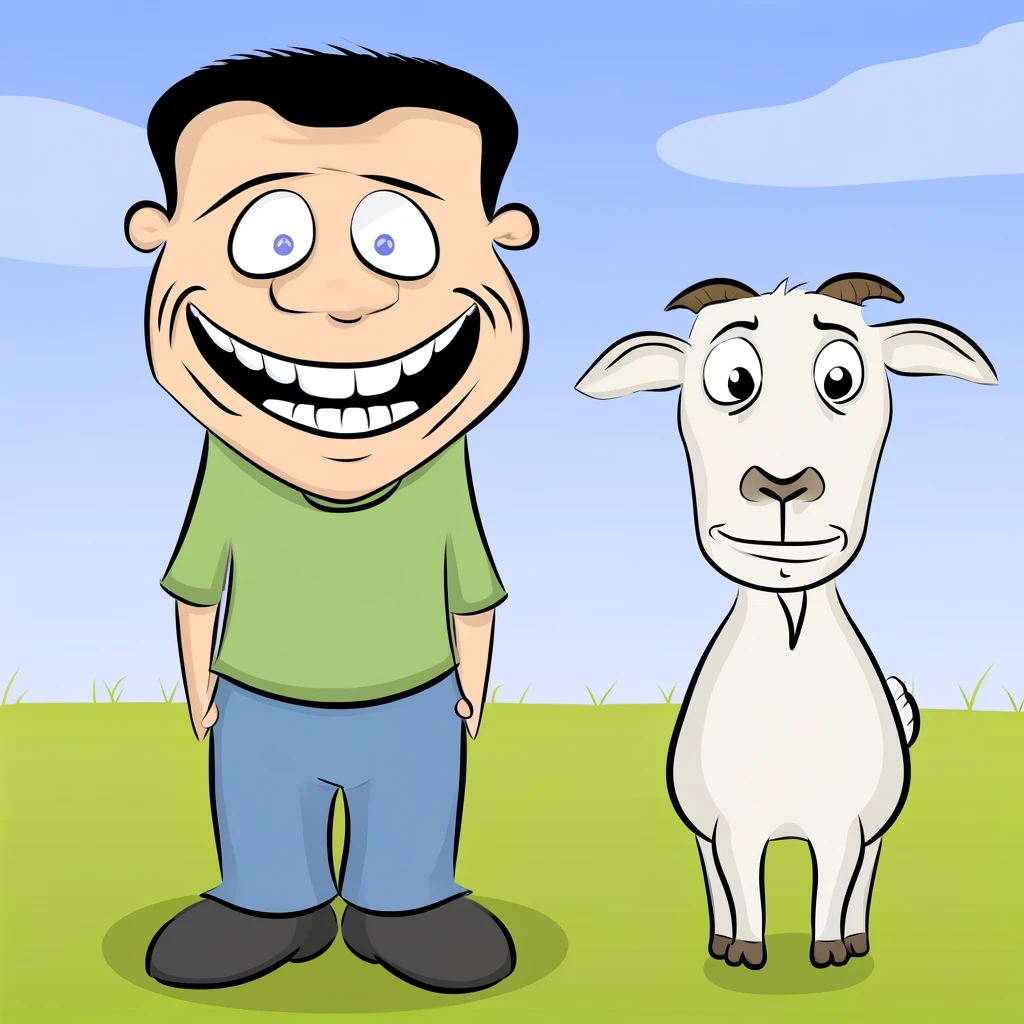Oh, hello there! I see you’ve stumbled upon this little corner of the internet, where we discuss all things goat-related. Let me guess, you’re thinking about diving into the wonderful world of goat ownership, aren’t you? Well, buckle up, buttercup, because you’re in for a wild ride!
First things first, let’s address the elephant (or should I say, goat) in the room: why on earth do you want a goat? Is it because you:
- Crave fresh, delicious goat milk for your morning coffee?
- Want to impress your friends with some homemade goat cheese?
- Have a burning desire to knit a scarf from your own goat’s luxurious fiber?
- Think having a mini goat in a sweater will make you Instagram famous?
- Believe goats will magically mow your lawn for free? (Spoiler alert: they won’t.)
Whatever your reason, it’s important to understand that goats are not just adorable, quirky creatures; they’re living, breathing animals with their own unique needs and personalities. So, before you rush out to adopt little Daisy Mae from the local farm, let’s dive into what it really takes to be a goat parent.
Are Goats Right For You? (Hint: Probably Not)
Goats are the ultimate escape artists. They’re like the Houdini of the barnyard. If there’s a way out, they will find it. Fence too low? They’ll jump it. Gate unlatched? They’ll nose it open. Hole in the fence? They’ll wiggle through it like a fluffy, horned contortionist.
And once they’re out, oh boy, it’s party time! Your prized rose bushes? Devoured. That lovely vegetable garden you’ve been tending to all summer? Decimated. Your neighbor’s brand new car? Scratched and dented from an impromptu goat parkour session.
So, before you bring home your new caprine companion, ask yourself:
- Am I prepared to build a Fort Knox-level goat enclosure?
- Do I have the patience to chase down a mischievous goat multiple times a day?
- Am I willing to sacrifice my landscaping to the insatiable appetite of a ravenous ruminant?
If you answered “no” to any of these questions, it might be time to reconsider your goat-owning dreams. But if you’re still on board, let’s talk about choosing the right goat breed for you!
Choosing the Perfect Goat Breed (Good Luck with That)
When it comes to goat breeds, the options are endless. From tiny, adorable Nigerian Dwarf goats to majestic, floppy-eared Nubians, there’s a goat out there for everyone. But how do you choose? Here are a few things to consider:
Size Matters
- Smaller breeds like Nigerian Dwarfs and Pygmies are perfect for urban homesteads or tiny backyards. They’re like the apartment-friendly version of a goat.
- Medium breeds like Alpines and La Manchas are great for small farms or homesteads with a bit more space.
- Large breeds like Nubians and Boers need room to roam. They’re best suited for larger properties with plenty of pasture.
Milk, Meat, or Fiber?
- If you’re in it for the milk, consider breeds like Nubians, La Manchas, or Saanens. These dairy queens can produce up to a gallon or more per day!
- For meat production, Boer goats are the way to go. These beefy boys can pack on the pounds like nobody’s business.
- If you’re dreaming of hand-knit goat wool socks, Angora and Cashmere goats are your best bet. Just be prepared for some serious grooming sessions.
Personality Matters
- Nubians are known for being vocal (read: loud) and stubborn. They’re the drama queens of the goat world.
- Alpines are generally easy-going and friendly, making them great for first-time goat owners.
- Nigerian Dwarfs are cute, curious, and sometimes a bit naughty. They’re like the toddlers of the goat world.
So, take your time, do your research, and visit some local farms to meet different breeds in person. And remember, no matter which breed you choose, you’ll need at least two goats. They’re herd animals and will get lonely (and loud) without a buddy.
Setting Up Goat Alcatraz
So, you’ve chosen your breed and you’re ready to bring home your new goaty pals. Not so fast! Before you introduce your herd to their new home, you need to make sure it’s escape-proof. And trust me, this is no easy feat.
Fencing
- Goats are notorious escape artists, so your fencing needs to be tall, sturdy, and secure. A good rule of thumb is to build your fence at least 4 feet tall, but taller is always better.
- Use woven wire fencing or livestock panels, and avoid welded wire fencing as goats can easily get their horns stuck.
- Make sure your fence posts are securely anchored and your gates latch tightly. Goats are clever creatures and will find any weakness in your fencing system.
Shelter
- Goats need a dry, draft-free shelter to protect them from the elements. A simple three-sided shed or small barn will do the trick.
- Make sure your shelter has good ventilation to prevent respiratory issues and plenty of space for your goats to move around comfortably.
- Include some elevated platforms or “goat toys” for your herd to climb and play on. Goats love to explore and having some enrichment in their environment will keep them happy and healthy.
Feeding and Watering
- Goats are browsers, not grazers, so they prefer a diet of leafy greens, twigs, and bark over grass. Make sure your pasture has plenty of variety to keep your goats happy and healthy.
- Provide your goats with fresh, clean water at all times. Goats are notorious for tipping over water buckets, so consider investing in a sturdy, spill-proof option.
- Supplement your goats’ diet with high-quality hay and a small amount of grain, especially if you’re milking them or they’re pregnant or nursing.
Safety First
- Goats are curious creatures and will put just about anything in their mouths. Make sure your pasture and shelter are free from any potential hazards like loose wire, sharp edges, or toxic plants.
- Keep an eye out for signs of illness or injury and have a good relationship with a local veterinarian who has experience with goats.
The True Cost of Goat Ownership (Hint: Your Sanity)
Now that you’ve got your goat palace set up, it’s time to talk about the real cost of goat ownership. And I’m not just talking about the price tag on little Daisy Mae.
The Initial Investment
- A goat can cost anywhere from $50 to $1,000 or more, depending on the breed, age, and whether they’re registered or not.
- But that’s just the beginning. You’ll also need to invest in fencing, shelter, feeding and watering equipment, grooming supplies, and vet care.
The Never-Ending Grocery Bill
- Goats are voracious eaters, and they need a constant supply of fresh hay, grain, and forage to keep them healthy and happy.
- And don’t forget the minerals! Goats need a specially formulated mineral supplement to prevent deficiencies and keep their coats shiny and their hooves strong.
The Time Commitment
- Goats require daily care, including feeding, watering, and milking (if you’re keeping dairy goats).
- They also need regular hoof trimming, vaccinations, and deworming to stay healthy.
- And let’s not forget the endless hours you’ll spend chasing your goats around the pasture, fixing fences, and cleaning up after them.
The Emotional Toll
- Goats are mischievous, stubborn, and sometimes just plain naughty. They’ll test your patience, your sanity, and your sense of humor on a daily basis.
- But they’re also incredibly loving, loyal, and entertaining. They’ll make you laugh, cry, and pull your hair out all in the same day.
So, before you bring home your new goat friends, make sure you’re prepared for the financial, time, and emotional investment that comes with goat ownership.
Welcome to the Wonderful World of Goats!
Congratulations, you’ve made it through the gauntlet of goat ownership preparation! You’ve chosen your breed, set up your escape-proof pasture, and stocked up on enough hay to feed a small army. You’re officially ready to bring home your new caprine companions.
But before you go, let me leave you with a few final words of wisdom:
Embrace the Chaos
- Goats are unpredictable creatures, and no matter how well you prepare, something will always go wrong. The water bucket will get tipped over, the fence will break, and your goats will find a way to get into trouble.
- But that’s all part of the fun! Embrace the chaos and learn to laugh at the craziness that comes with goat ownership.
Patience is a Virtue
- Goats can be stubborn, and they don’t always do what you want them to do. It takes time and patience to train them and earn their trust.
- But once you do, you’ll have a loyal, loving companion for life. So take a deep breath, count to ten, and remember that patience is key.
Goats are Addictive
- Once you get a taste of the goat life, it’s hard to go back. You’ll find yourself spending hours in the pasture, watching your goats play and graze.
- You’ll start researching goat cheese recipes and dreaming of hand-knit goat wool sweaters. Before you know it, you’ll be a full-fledged goat addict.
So, welcome to the wonderful world of goats! It’s a wild, unpredictable, and sometimes frustrating journey, but it’s also incredibly rewarding. You’ll laugh, you’ll cry, and you’ll probably step in a lot of goat poop along the way. But in the end, you’ll have a herd of furry, four-legged friends who will steal your heart and bring joy to your life in ways you never imagined.
Happy goat wrangling, my friend! May your fences be strong, your hay be plentiful, and your goats be forever entertaining.
Recent Posts
Welcome, aspiring competitive eaters, to the world of stuffing your face with obscene amounts of food for fame, glory, and maybe a free t-shirt! Yes, that's right, we're talking about the sport where...
How to Convince Your Boss You Have a Terminal Illness to Get a Raise
Well hello there, you sneaky little schemer! I see you've found your way to this blog post in a desperate attempt to get that raise you so richly deserve. I commend you for thinking outside the box...

